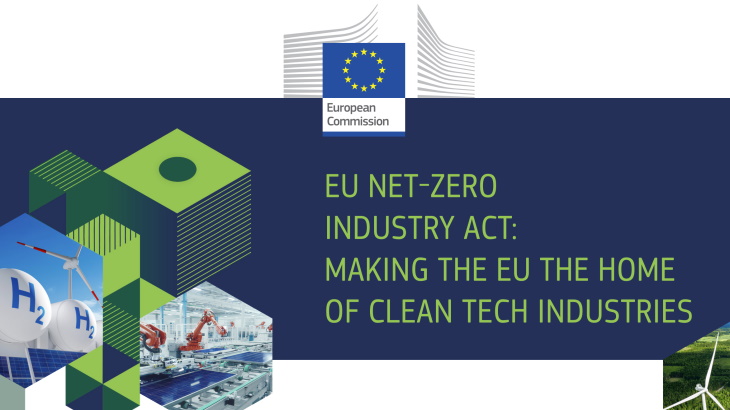Nuclear 'partially' included in EU's Net-Zero Industry Act
The European Commission (EC) has proposed the Net-Zero Industry Act (NZIA) to scale up manufacturing of clean technologies in the EU and make sure it is well-equipped for the clean-energy transition. However, nuclear trade body Nucleareurope said it fails to recognise the sector's full potential contribution.

(Image: European Commission)
The Commission said the NZIA - part of the EU's Green Deal Industrial Plan and seen as a response to the USA's Inflation Reduction Act - will "strengthen the resilience and competitiveness of net-zero technologies manufacturing in the EU, and make our energy system more secure and sustainable. It will create better conditions to set up net-zero projects in Europe and attract investments, with the aim that the Union's overall strategic net-zero technologies manufacturing capacity approaches or reaches at least 40% of the Union's deployment needs by 2030.
"This will accelerate the progress towards the EU's 2030 climate and energy targets and the transition to climate neutrality, while boosting the competitiveness of EU industry, creating quality jobs, and supporting the EU's efforts to become energy independent."
The proposed legislation addresses technologies that the EC says will make a significant contribution to decarbonisation. These include: solar, wind, batteries and storage, heat pumps and geothermal energy, electrolysers and fuel cells, biogas/biomethane, carbon capture, utilisation and storage, and grid technologies, sustainable alternative fuels technologies, as well as "advanced technologies to produce energy from nuclear processes with minimal waste from the fuel cycle, small modular reactors (SMRs), and related best-in-class fuels".
Among the aims of the NZIA is to improve conditions for investment in net-zero technologies by "enhancing information, reducing the administrative burden to set up projects and simplifying permit-granting processes. In addition, the Act proposes to give priority to Net-Zero Strategic Projects, that are deemed essential for reinforcing the resilience and competitiveness of the EU industry".
"We need a regulatory environment that allows us to scale up the clean energy transition quickly," said President of the European Commission, Ursula von der Leyen. "The Net-Zero Industry Act will do just that. It will create the best conditions for those sectors that are crucial for us to reach net-zero by 2050: technologies like wind turbines, heat pumps, solar panels, renewable hydrogen as well as CO2 storage. Demand is growing in Europe and globally, and we are acting now to make sure we can meet more of this demand with European supply."
The proposed regulation now needs to be discussed and agreed by the European Parliament and the Council of the European Union before its adoption and entry into force.
Nuclear has bigger role to play
However, Nucleareurope said the EC, by referencing SMRs and advanced reactors, had only partially included nuclear in the NZIA.
"Whilst this is a step in the right direction, Nucleareurope believes that much more could still be achieved by including the nuclear sector as a whole and treating nuclear in the same way as other strategic technologies," it said.
"We understand that the discussions around the inclusion of nuclear under the NZIA have proved challenging, and so it is positive to see at least some reference to nuclear technologies in the text," said Nucleareurope Director General Yves Desbazeille. "But unfortunately, this is not enough.
"The US has recognised the importance of supporting its entire nuclear sector by including it under the Inflation Reduction Act. By supporting the European nuclear sector through the NZIA, the EU has the opportunity of placing us on an equal footing with other global regions, and of remaining a key player in the global competition for clean technologies".
In a 13 March open letter calling for the inclusion of nuclear as a strategic technology under the NZIA, the nuclear industry noted: "Not only does nuclear account for the greatest share of the EU's electricity mix (currently around 25% of all electricity produced and 50% of low carbon electricity), the European nuclear sector is composed of a highly skilled manufacturing capacity based in the EU."
Nucleareurope said: "The nuclear industry stands ready to deliver what is needed to reach net-zero by 2050, ensure security of supply, strengthen European resilience and tackle affordability."
Researched and written by World Nuclear News
- China Institute of Atomic Energy
- Nuclear Power Institute of China
- Southwestern Institute of Physics
- China Nuclear Power Operation Technology Corporation, Ltd.
- China Nuclear Power Engineering Co., Ltd.
- China Institute for Radiation Protection
- Beijing Research Institute of Uranium Geology (BRIUG)
- China Institute of Nuclear Industry Strategy (CINIS)
- China Nuclear Mining Science and Technology Corporation


